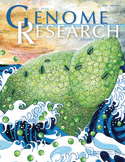Ethical, legal, and social considerations in conducting the Human Microbiome Project
- Amy L. McGuire1,7,
- James Colgrove2,
- Simon N. Whitney3,
- Christina M. Diaz1,
- Daniel Bustillos4, and
- James Versalovic5,6
- 1 Center for Medical Ethics and Health Policy, Baylor College of Medicine, Houston, Texas 77030, USA;
- 2 Mailman School of Public Health, Columbia University, New York, New York 10032, USA;
- 3 Department of Family Medicine, Baylor College of Medicine Houston, Texas 77098, USA;
- 4 Center for Health Care Ethics, Saint Louis University, St. Louis, Missouri, 63103 USA;
- 5 Departments of Pathology, Pediatrics, Molecular Virology & Microbiology, and Molecular and Human Genetics, Baylor College of Medicine, Houston, Texas 77030, USA;
- 6 Departments of Pathology and Pediatrics, Texas Children’s Hospital, Houston, Texas 77030, USA
This extract was created in the absence of an abstract.
The early days of the genomic revolution—from the Asilomar Conference on Recombinant DNA in 1975 to the founding of the Human Genome Project in 1990—were marked by awareness among researchers, government officials, and policy makers that emerging scientific knowledge raised a host of ethical, legal, and social challenges. Scientists now undertaking research on the human microbiome—including those engaged in the National Institutes of Health’s (NIH) latest Roadmap initiative, the Human Microbiome Project (HMP)—confront a similarly uncharted ethical landscape. Not only does the conduct of human microbiome research raise important ethical considerations, but the long-term implications of the HMP also present the possibility of fundamental shifts in understandings of human life and health.
The HMP is one of several international efforts to use metagenomic analysis to study human health. It is estimated that there are 10 times as many microbial cells than human cells in and on our bodies (Turnbaugh et al. 2007). We already know that human microbiota (i.e., all the microorganisms that inhabit the skin and mucous membranes) in certain sites of the body play an essential role in maintaining health and normal function (e.g., synthesis of vitamin K in the intestinal tract) (Lupp and Finlay 2005). The HMP aims to create a reference catalogue of microbial DNA that can be used as a resource to explore whether or not humans have a “core” microbiome (i.e., a microbiome that is common to all humans); whether there is stability in an individual’s microbiota through different periods in that individual’s life; whether there are similarities in microbiomes within families, communities, and different environments (Palmer et al. 2007); and ultimately, whether or not changes in the human microbiome can be correlated with changes in human health.
A total of $8.2 million was awarded in 2007 to four institutions (Baylor College of Medicine, …











